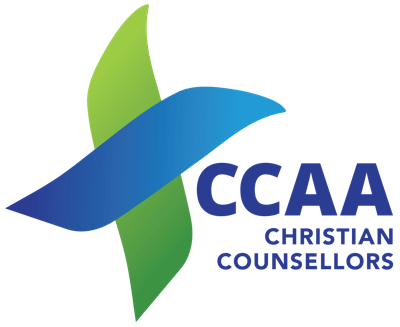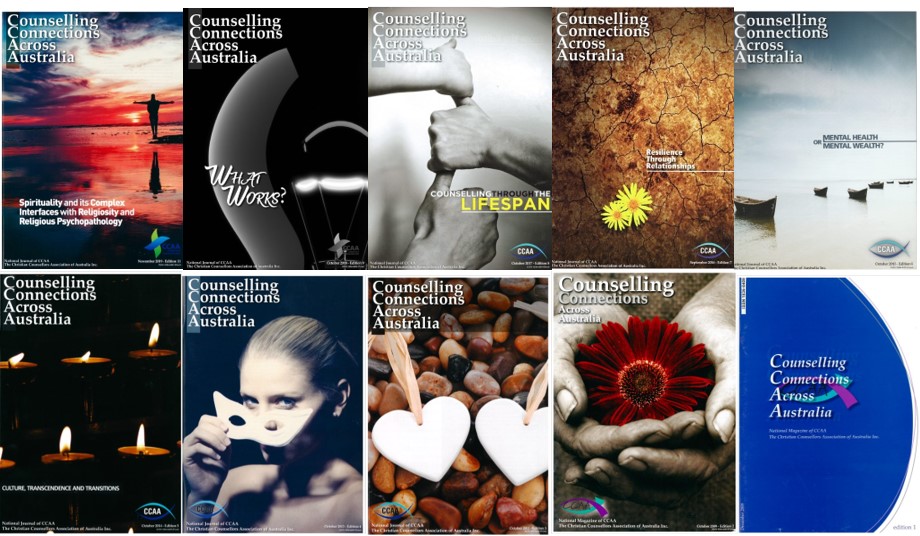CCAA Journal
‘Counselling Connections Across Australia’ is CCAA’s national, annual journal, of which all CCAA Members receive a free copy. Through our journal, CCAA seeks to promote the responsible integration of faith into counselling practice and to encourage and promote excellence in counselling and psychotherapy.
The goals of Counselling Connections Across Australia include:
To publicise and promote CCAA to the professional counselling community.
To develop the practice and understanding of counselling and psychotherapy through research and reflection on theory and clinical experience.
To provide an avenue for appropriate written expression to the Christian counselling fraternity.
To express the values, vision and mission of CCAA.
Theme for 2022:
The theme for the 2022 Journal is “Faith versus Futility”.
We invite the submission of articles on this topic in general – from a biblical or clinical counselling perspective. All journal submissions should be submitted via email to:
- Journal Editorial Committee Chair: Mr Ian Parkin journal@ccaa.net.au
- Editors: Lyndy Burt, Maureen Ireland, Dominie Nelson, Ian Parkin
Contributors should provide their name/s, postal and email address and a short paragraph on your professional interests, qualifications, professional memberships and counselling experience and a passport-sized digital coloured photo of high resolution with the submission.
Standards of Publication:
Articles are to be between 1000–2500 words and reflect a scholarly approach to the subject matter. Contributors may write in an academic manner as well as narratives describing personal clinical experience that captures the essence of counselling. (Examples of previous journal articles can be found under the PD/Resources tab at www. ccaa.net.au). Good articles contain:
- Research results and appropriate literature
- Substantiation of key points in a logical presentation
- Inclusion of interesting and relevant case studies (wherever possible) making sure that appropriate privacy and ethics approval are observed
- Properly referenced with a bibliography using APA style.
- Refer to below for more details on the types of articles.
Date Due:
The deadline for submissions for the 2022 journal is 7th August 2022.
Please note that all articles are subject to editing processes and approval before printing.
Purchasing Copies of
all Editions
All journals can now be purchased in hard copies. Click here to purchase now. We have limited supplies of hard copies of the journal, which you can order and pay online using the link above. The orders will be processed as soon as possible and sent to you.
The costs for each edition varies with postage and handling covered in the price.
- 2021 – ‘Hope over Fear’ Hard copy $12 – digital download – $8
- 2020 – ‘Grace’ digital download – $8
- 2019 – ‘Spirituality … Psychopathology’ -$14
- 2018 – ‘What Works?’ – $15
- 2017 – ‘Counselling through the Lifespan’ – $13
- 2016 – ‘Resilience Through Relationships’ – $12
- 2015 – ‘Mental Heath or Mental Wealth’ – $12
- 2014 – ??? – $10
- 2014-2019 – Buy all six copies and save $25 – Normally $100, now $75.
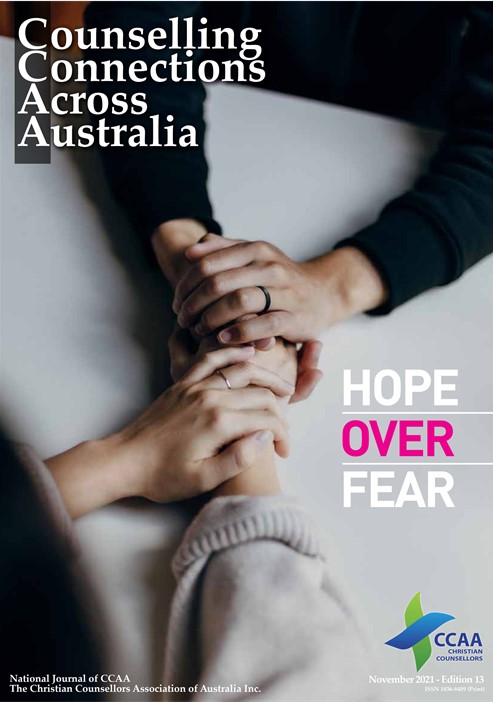
2021
- The articles in this year’s journal explore the hidden anxiety many may feel about topics such as grief and loss and death and dying. These existential meaning making questions may sometimes be overlooked or ignored by clients and even therapists, we trust as you explore these they will help you in your work and in your own life.
- Please find below the articles in this Journal with the Preamble.
Hope appears in ancient Greek mythology with the story of Zeus and Prometheus. Prometheus stole fire from the god Zeus, which infuriated the supreme god. In turn, Zeus created a dowry chest that contained all manners of evil and admonished Pandora not to look inside her dowry chest. When Pandora finally reached Earth, of course, the first thing that she did was to open the lid to take a peek.
This paper provides a review of Personcentred approached which is drawn from humanistic counselling. I review this approach to counselling with a specific focus on the Rogerian approach. The humanistic approach emerged with the works of Maslow, then later Carl Rogers, Rollo May and Eric Frome.
What resonates for me is Carl Rogers’ Person-centred theory as a message
of hope for both the counsellor and the client. The notion that individuals are
capable of self-actualising tendencies, being creative, finding their own
answers became a new way of thinking about the client-counsellor process. In
essence, I reflect on the seminal work of Rogers and its influence across a
range of disciplines.
If you were alive and compos mentis
in the 1960s you would remember
the hula hoop craze. Well, more
recently, an unknown cynic said
that “if 2020 was a hula hoop it would
be made of barbed wire”. It was truly
a year to endure and for some, a year
to forget. Stories abound in the media
where COVID 19 has separated or
devastated families and some reports
estimate it has resulted in millions of
deaths while lockdowns and restricted
travel has bought the economies of
many nations to their knees.
In some health services, mental health
is relegated to the unenviable position
similar to that of the fictional ‘Cinderella’,
and considered less important than
other health concerns. Is mental health
the ‘Cinderella’ in church as well? We
will first consider why this question is
important, before taking a closer look
at the history of mental health care in
Christian churches.
This paper is written to encourage
consideration of the psychic reality
of grief, with its emotional impact.
It proposes the possibility that as we
allow ourselves to move into grief, as we
understand and accept, new energy and
action can emerge. Old assumptions
of power, prestige, self fulfillment, and
inequality can change. New, better ways
to cope can emerge from the groaning
in grief.
This paper is a reflection upon my own journey through the valley of the shadow of death. I have presented this in the hope that it may encourage others as well as give tools for grief counselling.
There is a presumption that coming
closer to a higher power has positive
consequences. An evangelist might call
that a conversion experience yet is that
not just the beginning of the journey?
As a person draws closer to God there
potential for a deeper richer and more
effective life is enhanced and this might
be defined as the ultimate freedom. Once
freed does the spirit then sour and in
doing so lead a therapist to reach their
fullest potential?
This is an immensely practical and encouraging book giving a Christian Integrative approach to supervision. The Author gives a valuable and substantial overview of psychological theories, research and clinical practice and weaves these into a Christian model of supervision.
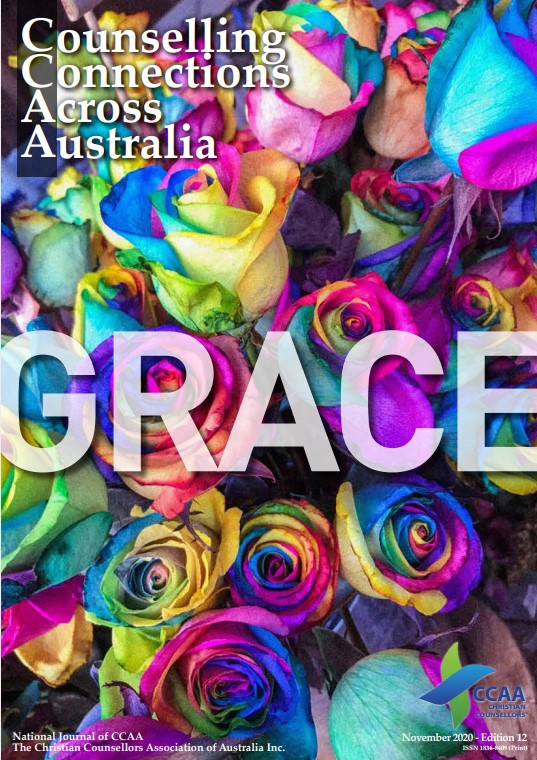
2020
- Grace – an important aspect of the Christian Counsellor.
- God forms us into a
- Relationship with him and with each other. Through our
- Attachment needs being met we learn to
- Counsel with, it is hoped, greater
- Empathy and understanding
- Please find below the articles in this Journal with the Preamble.
A literature review of factors that may be predictors of whether a person is likely to succeed in retirement. A successful retirement would be defined as a person who is well adjusted and has lived for no less than ten years after leaving paid employment, enjoys reasonable health, is well adjusted mentally and physically and engaged in activities of daily life. Factors that could be predictors might include financial security, family history, religious beliefs, culture, attitude to life, age at retirement and relational support.
The research indicates a need for a long-term study of this important subject given the possibilities of intervention at either a pre-retirement or post retirement phase of development.
This article explains how the postmodern
conception of truth can be related to
a Christian understanding of truth by
using the Russian Babushka dolls as a
metaphor. Babushka dolls represent a
family, made up of four dolls that fit inside
each other – a father, mother, son and
daughter. They illustrate that the way we
can integrate our Christian understanding
of truth with postmodern relativism is to
conceive truth as having four tiers.
When I was a young Christian, I was told -in hushed tones which bespoke both disgust and stigma -that people struggling with depression lacked spirituality. After many years, such stigma and misunderstanding still exists and it’s important that we, as Counsellors/Psychotherapists, are not only well acquainted with the problem of depression, but that we can also undo some of the very real stigma, shame and guilt which is so often still attached to the problem of depression.
In response, this paper will consider the following issues: the reality of depression, the root causes of depression and a variety of healing responses which Counsellors may use in their work
This essay will describe and reflect on how the author is delivering supervision to a group of social workers and therapists in The Peoples Republic of China (China). This supervision practice is shaped by the cultural context of this group of generally inexperienced practitioners. The author researched additional articles that address the sociopolitical context for providing a culturally appropriate model of external clinical supervision to this group.
During the 1960’s and 1970’s I was providing a counselling practice in Sydney’s housing commission area in the Western Suburbs.
In those years I was introduced to many clients suffering the trauma of severe sexual abuse both as children and adults. One thing became obvious to me at the time was the inadequacy of the talk therapy models available to offer any more than comfort with little prospect of real change.
This lead to my searching for alternate models.
Abuse, particularly sexual abuse, robs a person of the right to possession of their own body. Locked tissue is no longer available to the person but is left to remain property of the abuser. It seemed to me that the therapeutic task was to assist clients in the repossession of their own bodies. But how?
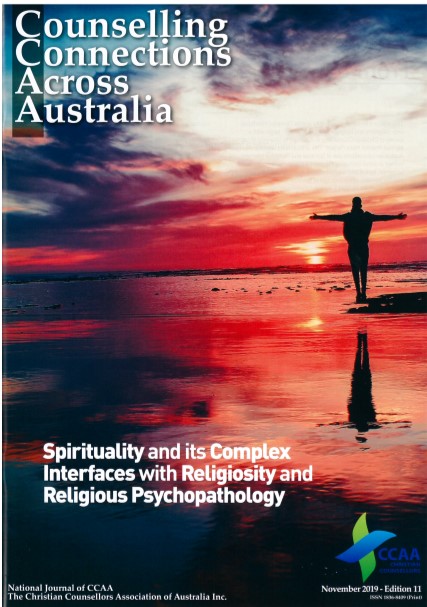
2019
- Contributors
- Different World Views – Gaston Antezana
- Innovative Counselling Practice Dealing with Shame – Kirsten Hampson
- Is Faith Delusional? – Prof. Andrew Sims
- My Religious Psychopathology and the DSM 5 – Dr. Peter Milnes
- New Perspectives on Supervision – Dominie Nelson
- No Longer a Sinner Saved by Grace – Dr. John Andersen
- Practice Makes Perfect – Shannon R. Hood
- The Immanuel Approach – Wendy Hayes
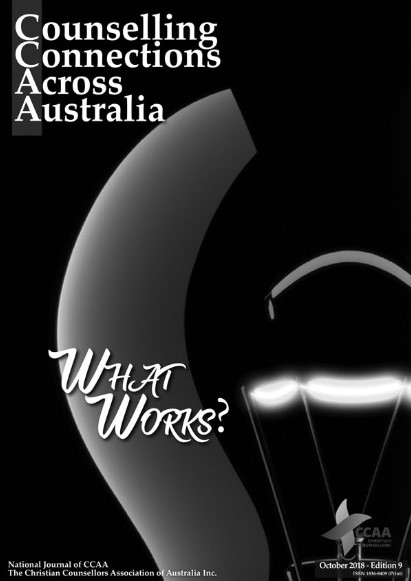
2018
- Values, Vision & Mission
- The Way Forward (National Council of CCAA)
- Contributors
- Theological Requirements for CCAA Members
- Bad Day at Black Rock – Naomi Wheeler (Peer Reviewed)
- How EFT Therapists Can Work with Clients from Chinese Cultures – Iris Yip (Peer Reviewed)
- Supervision of Counsellors and Clergy-The Same, Only Different – Diana Green (Peer Reviewed)
- What Works-How Much of Effective Counselling is a Placebo Effect – Robert Blakeman (Peer Reviewed)
- The Arduous Journey from Dismay to Peace – Hannah Faveere (Peer Reviewed)
- What Works in Spiritual Counselling – Dr Peter Milnes
- From Ugly Ducklings into Beautiful Swans – John Andersen
- What Works with Couples-Why Marriage is for Grown-ups – Noel Giblett
- Heaven Now-Walk with Me – Dr Genevieve Milnes
- Farewell to our National President 2004-2017
- Guide to Contributors
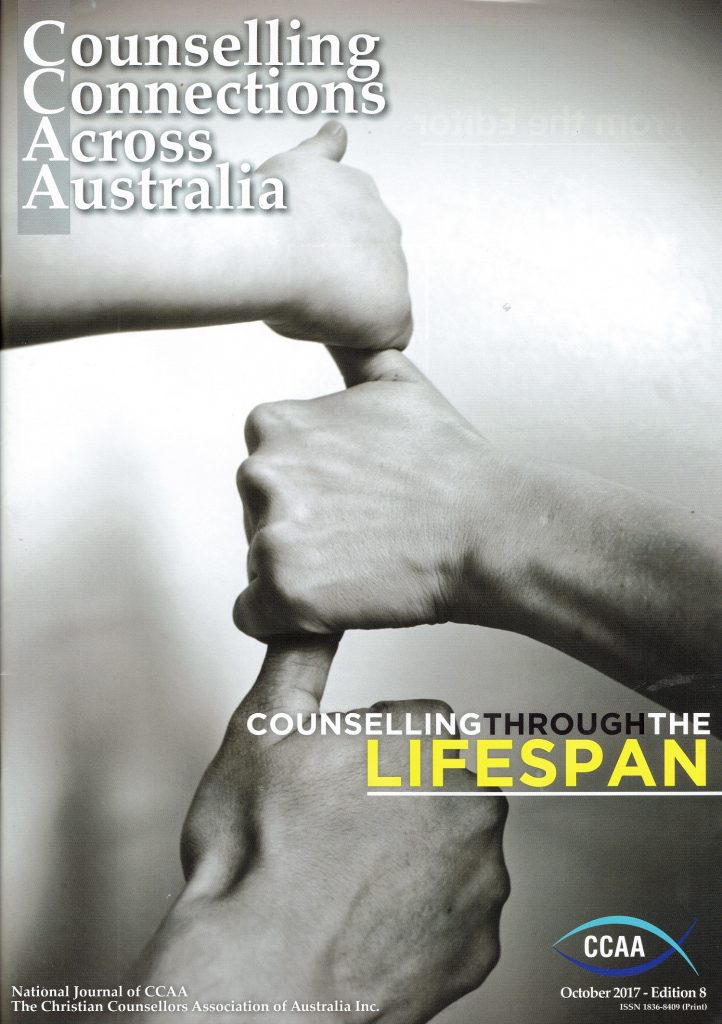
2017
- President’s Summary – John Andersen
- No Selfie Necessary – Bill Van Schie
- Identity development of Transnational South African Migrants to Australia – A. Klingenberg, Dr J.M. Luetz & Dr Ann Crawford
- A Bibilical Basis for Psychosocial Interventions – Michelle Fletcher & Sharon Nillsen
- Unlock Hearts … with a Pebble! – Ruth Parfett
- Some Practice Thoughts Concerning Aged Counselling – Susan Viney
- Working with Families Headed by a Parent with a Learning Difficulty – Gaye James
- Midlife Crisis or Midlife Transition? – Wendy Cotter
- Are Other People Hell or Just Objects? – John Andersen
- Passive the Endangers the Soul – Drs Peter & Genevieve Milnes
- Christian Psychology: Towards the Reconciliation of Science and Religion – Drs Peter & Genevieve Milnes
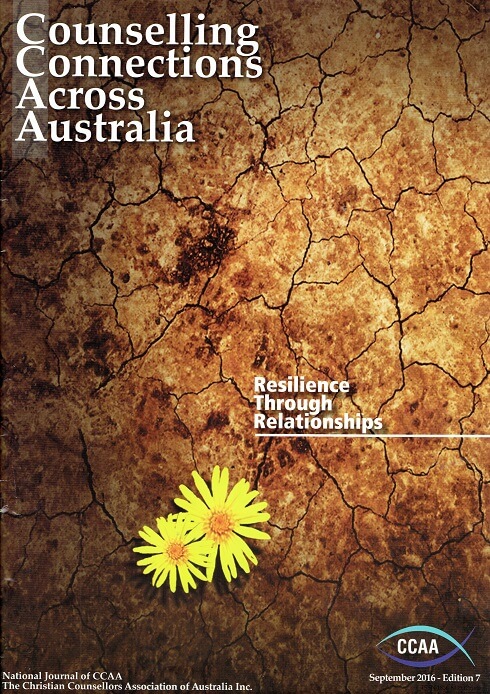
2016
- Attachement and the snake in the garden – John Andersen
- A Theological trilogy of Relationship Counselling
Part 1 – Are other people hell? – Drs Peter & Genevieve Milnes
Part 2 – Dancing with phantoms or dancing with life? – Drs Peter & Genevieve Milnes
Part 3 – Dancing with disgust – Drs Peter & Genevieve Milnes - The writings on the wall – Dr Graham A Barker
- Couples finding a silver lining amid the dark cloud of ME/DFS – Robyn Lingard & Dr John Court
- Enhancing resilience for survivors of Childhood sexual abuse – Sally Napthali
- Play Therapy: Respect and relationship for repair and resilience – Vivienne Mountain
- Building resilience through positive education – Liz Musgrove
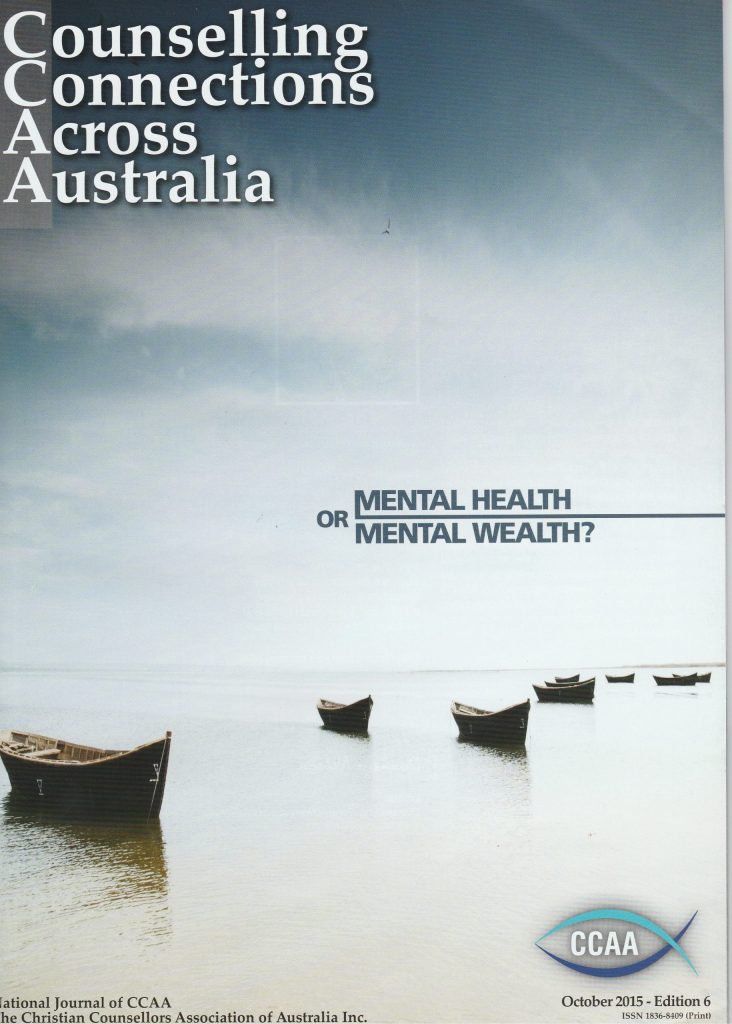
2015
- The Broken Strong – Paula Davis
- A Christian Attachment-based Therapy Can Support Psychological Healing and Spiritual Growth – Dr Maureen Miner
- The Key to Mental Health is Found in the Search for Meaning – Dr Peter Milne
- Chronic Shame – John Andersen
- Becoming Effective in Trauma Work – Dominie Nelson
- The Borderline Personality from a Christ Centred Lens – Susan Johnston (References)
- Our Adult Child has Clinical Depression – Julie Weeks
- The Heart and Soul of Christian Counselling – John Andersen
- Emotionally Focused Therapy – Jade Roberts
- The Problem of Youth Suicide – Dr A Williams
- The Professionalization of Counselling – Dominie Nelson
- From Roadmaps to Recovery (SA PD Event) – Dominie Nelson
Submitting an Article for Publication
CCAA welcomes qualified readers to submit articles for publication in the Counselling Connections Across Australia Journal. Submissions should be provided for consideration via email to the Journal Editorial Team at journal@ccaa.net.au. Please include your name, postal address and email address with your submission. Examples of previous journal articles can be found on our articles page.
Readers are invited to submit material within the following categories and should note that all submissions will be subject to editing processes and approval
300-600 words in length.
Should outline the key theme(s) of the book and your recommendations as to the contexts in which the book is best suited.
Please include a photo of the book.
1000-2000 words in length.
Should ideally be in a narrative form and consist of you sharing a case or practice idea with your colleagues.
Individual clients and workplaces should be de-identified to protect privacy. Many contributors choose to develop a representational client based on a compilation of their actual clients. Alternatively, you could seek permission to share the story from your clients (please still de-identify them).
A bibliography, APA style, should be included at the conclusion of your case study/practice reflection. Footnotes are discouraged and appendices are preferred.
A short paragraph on your professional interests, qualifications, professional memberships and counselling experience should accompany your submission.
Please include a passport-sized, high resolution, digital colour photo of yourself.
These should come from senior, bachelor level or postgraduate students working at a distinction level or above.
Adapted single or double semester projects related to specific journal themes are most likely to be accepted.
Please seek advice from your department head or research supervisor prior to submission.
Contributions can be between 1000–3000 words and reflect a scholarly approach to the subject matter. Research and the substantiation of key points and arguments are expected.
Contributions are to be logically and clearly organised, with use of appropriate nomenclature for professional counselling.
Style may be narrative or analytical and stated in the third person.
A bibliography, APA style, should be included at the conclusion of your case study/practice reflection. Footnotes are discouraged and appendices are preferred.
A short paragraph on your professional interests, qualifications, professional memberships and counselling experience should accompany your submission.
Please include a passport-sized, high resolution, digital colour photo of yourself.
Content is to be relevant to the current journal theme.
Articles should be between 1500–5000 words and reflect a scholarly approach to the subject matter. Research and the substantiation of key points and arguments are expected.
Contributions are to be logically and clearly organised with use of appropriate nomenclature for professional counselling
Style may be narrative or analytical and stated in the third person.
Contributors may write from personal clinical experience in order to capture the essence of clinical work in the counselling field. Examples of this writing style may include case studies or individual case reports which provide a clinical exploration and discussion relevant to the current journal theme. Reference to literature that assists readers to understand the issues raised must be included.
A bibliography, APA style, should be included at the conclusion of your case study/practice reflection. Footnotes are discouraged and appendices are preferred.
A short paragraph on your professional interests, qualifications, professional memberships and counselling experience should accompany your submission.
Please include a passport-sized, high resolution, digital colour photo of yourself.
These should comply with the themed article guidelines and, in addition, articles submitted for peer review must be accompanied by a letter requesting such.
Master’s and Doctorate students may apply with an adapted thesis related to the journal theme.
A copy of the article is to be submitted with a separate page giving your name, address and contact details (email preferred). No identifying material (author or participants) is permitted within the body of the article.
Peer review is conducted by two reviewers who are familiar with the counselling field and are academically qualified. Peer review results in a higher standing for published articles having completed the peer review process.
The submission of articles implies permission for editorial process and changes to the article as deemed necessary. The articles are reviewed by the Journal Editorial Team and authors of articles selected for inclusion in the Journal will be informed by the Editorial Chair.
Publication includes electronic publication to the CCAA website.
A courtesy copy of your article with any editorial changes will be forwarded to your email address at the time of Journal publication, if you are not a Member of CCAA.
A complimentary copy of the Journal containing published articles will be posted to all contributors. Additional copies, if requested will be forwarded at a cost of $15 per copy (inclusive of postage).
Advertising space is available within the journal, subject to approval.
Content of advertisements may include services, products or opportunities relevant to counsellors and psychotherapists or the clients they serve. Rates and formatting requirements are available upon application to the editor journal@ccaa.net.au. Administrator admin@ccaa.net.au
Our readership includes clinical counsellors, counselling supervisors, counsellor educators, counselling training college staff, social workers, psychologists, undergraduate and post graduate counselling trainees and our Associate Members such as pastoral carers and ministry team members.
We actively promote quality counsellor and psychotherapy education as well as books and counselling and psychotherapy resources.
We distribute 1,000 copies on an annual basis.
CCAA Journal
From $8.00
Timezone
UTC+11
Sale!
CCAA Journal
Price range: $8.00 through $65.00
Status
33 Qty Available
40 Has Sold

